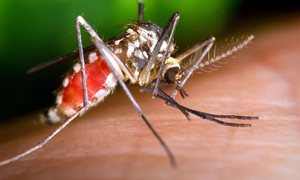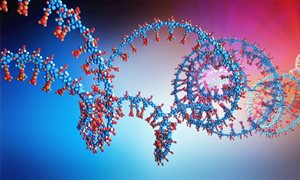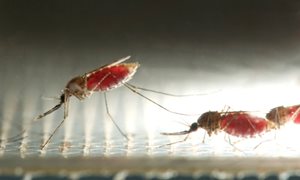
On life support or no complaints at all: our DNA plays an important role in the course of COVID-19. Researchers at the Radboud University Medical Center mapped out the current knowledge on all genetic errors that are associated with a serious course of the disease. They published their overview in Genome Medicine.
One person with COVID-19 ends up seriously ill in the ICU, while another only develops a minor cough. Scientists are gaining a better understanding of the causes of these differences. In addition to known risk factors such as obesity, male gender and chronic illness, variation in our DNA plays an important role. Especially in healthy young people with serious symptoms, the cause can lie in just one rare genetic error, which disrupts the immune response against the coronavirus.
Geneticist Alexander Hoischen and physician-researcher Cas van der Made together with colleagues created an overview of the current knowledge about these rare genetic causes that greatly increase the risk of serious COVID-19. Van der Made: ‘We collected the results of many studies from around the world, with genetic data from a total of tens of thousands of people with COVID-19 and millions of healthy volunteers.’
Genetic factors
Some studies worked with a technique called Genome Wide Association Study (GWAS). Smart software compares the genetic analyses of very many people and detects whether certain areas in the DNA contain errors more often in the group with severe COVID-19. This was indeed found to be the case. The studies found a dozen areas that are normally involved in the immune system in the lungs and the clearance of virus particles, including, for example, the production of mucus and immune substances such as type 1 interferon.
Other studies used Whole Exome Sequencing, a technique in which researchers can very accurately detect rare genetic errors. This technique showed that errors in Toll like receptor 7 (TLR7) forms the main risk factor for serious disease. Hoischen and his colleagues discovered this already during the first corona wave, when they looked at the DNA of young brothers who both ended up in the ICU, while previously they had been completely healthy. Meanwhile, such errors in TLR7 have been found worldwide in young men with severe COVID-19. Hoischen: ‘For us it is nice to see that our very first finding has been replicated several times and that more and more knowledge is being accumulated.’
Capturing virus particles
‘TLR7 is a molecule that is normally found on vesicles inside certain immune cells’, explains Van der Made. ‘There it recognizes virus particles. Once that happens, the immune cells start making all kinds of substances, including type 1 interferons. That substance is required to limit the spread of the virus. If someone has an error in the DNA and therefore makes no or less functional TLR7, the immune response is not sufficient and the virus can multiply uncontrollably. That gives a much greater chance of serious illness.’
In addition to TLR7, other genes are more likely to contain rare errors in people with severe COVID-19. Van der Made: ‘What these genes have in common is that they all normally work in the same processes in the body: the recognition of viruses, the innate immune system, and disabling the viruses with substances called interferons, including type 1 interferon.’
Screening
Blood type also matters in the risk of serious illness. ‘Blood type A seems to give a higher risk, while blood type O is protective’, says van der Made. ‘It is not yet entirely clear how that works. People with blood type O have substances in their blood against blood type A and blood type B, which we think might protect against the virus. In addition, differences in blood clotting may play a role.’
In their review article, the researchers urge research into hereditary errors, such as in the TLR7 gene. ‘We especially recommend screening children and young people with severe symptoms, because that can improve the recognition and treatment of these patients’, says Hoischen. ‘In addition, the discovery of such errors can also have consequences for the family. If family members are also at higher risk, they can be vaccinated earlier or more often, or be more cautious.’
About the Publication
This review article was published in Genome Medicine: Clinical implications of host genetic variation and susceptibility to severe or critical COVID-19. Caspar I. van der Made, Mihai G. Netea, Frank L. van der Veerdonk, Alexander Hoischen.
-
Want to know more about these subjects? Click on the buttons below for more news.
More information
Annemarie Eek

wetenschapsvoorlichter
Related news items

Grants for research on magnesium deficiency and malaria Vidis for Felix Hol and Jeroen de Baaij
1 July 2022 Radboudumc researchers Jeroen de Baaij and Felix Hol both receive an NWO Vidi grant for their research, respectively on magnesium deficiency in type 2 diabetes and on malaria. go to page
Field research on malaria vaccine offers unexpected surprise
23 May 2022Field research on the effectiveness of a malaria vaccine, came up with unexpected results for an international group of researchers including Benjamin Mordmüller of Radboudumc. The vaccine evokes a broader response against malaria proteins than there are in the vaccine.
go to page
Rubicon grants awarded to three RIMLS researchers
19 April 2022Three researchers have received Rubicon funding from NWO/ZonMw. This will enable Elke Muntjewerff, Laura de Vries and Laurens van de Wiel to do research at a foreign research institute for the next two years.
go to page
Neolithic made us taller and more intelligent, but more prone to heart disease How modern European populations have evolved over the past 50,000 years
6 April 2022 After the Neolithic, European populations showed an increase in height and intelligence, reduced skin pigmentation and increased risk of cardiovascular disease due to genetic changes that lowered concentrations of 'good' HDL cholesterol. go to page

